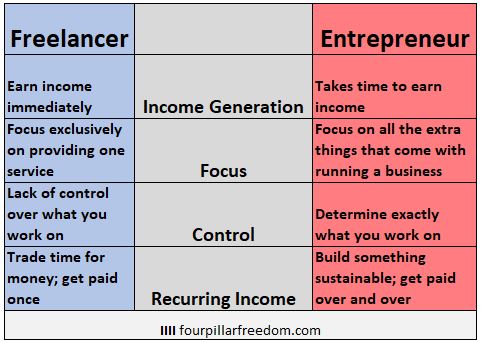
4 min read
If you hate your day job, there are a few ways to escape it:
1. Switch to a different job, preferably one with more flexibility, less stress, and a better work environment.
2. Become a freelancer.
3. Become an entrepreneur.
When I began to hate my own day job earlier this year, I contemplated pursuing option (1) and simply switching companies. The more I thought about it, though, the more I felt that a new job wouldn’t solve my hatred for commutes, bosses, strict schedules, and dress codes. So, I chose option (3) and decided to go full-time on my portfolio of income-generating websites.
Thanks to the internet, I believe that it’s more realistic than ever for people who hate their jobs to pursue options (2) and (3) to gain more freedom and flexibility in life.
However, while being a freelancer and being an entrepreneur both give you tremendous freedom over your time, they do so in completely different ways. And depending on your personality and your goals, one option may be better than the other.
In this post, I explore the pros and cons of freelancing vs. entrepreneurship.
Freelancer vs. Entrepreneur
A freelancer is someone who earns money by working on specific projects for different clients while an entrepreneur is someone who earns money by starting a business of some type.
I’ve always liked Seth Godin’s description of freelancers and entrepreneurs:
A freelancer is someone who gets paid for her work. She charges by the hour or perhaps by the project. Freelancers write, design, consult, advise, do taxes and hang wallpaper. Freelancing is the single easiest way to start a new business.
Entrepreneurs use money (preferably someone else’s money) to build a business bigger than themselves. Entrepreneurs make money when they sleep. Entrepreneurs focus on growth and on scaling the systems that they build. The more, the better.
The end goal for freelancers vs. entrepreneurs tends to be quite different, as Godin also describes:
The goal of a freelancer is to have a steady job with no boss, to do great work, to gradually increase demand so that the hourly wage goes up and the quality of gigs goes up too.
The goal of the entrepreneur is to sell out for a lot of money, or to build a long-term profit machine that is steady, stable and not particularly risky to run. The entrepreneur builds an organization that creates change.
An example of a freelancer would be someone who does freelance writing for websites. For each article they write, a website will pay them a fixed amount.
Conversely, an example of an entrepreneur would be someone who starts their own website and writes their own articles or pays someone else to do so.
Each approach has pros and cons.
The Pros & Cons of Freelancing
Freelancing has two major pros:
1. You only need to focus on one thing. As Seth Godin explained, “Freelancing is the single easiest way to start a new business.” Freelancers provide a specific service to a company and get paid for doing so.
For example, a freelance writer doesn’t have to worry about setting up their own website, dealing with plugins, hosting fees, domain registration, backend setup, and everything else than comes with running your own site. They simply have to focus on providing a specific service to the best of their ability.
2. You can earn money immediately. A freelancer can earn income much quicker than an entrepreneur in the same field. For example, it might take six months or more for a new website to start generating income in the form of ads, affiliate links, or products. Conversely, a freelancer can write an article for a website and receive payment immediately.
Freelancing does have a couple cons, though:
1. You don’t control what you work on. As a freelancer, the company that you’re working with will assign you a specific project or task to work on. Due to this lack of control you may find the work that you’re doing to be boring or meaningless at some point.
2. You only get paid once. As a freelancer, you’re selling your time for money. This means you only get paid once, without the possibility of receiving the benefits of your work over and over again.
For example, a freelance writer may get paid $300 to write an article for a website. After that, though, the website owns the article along with the rights to any income the article generates in the form of ads, affiliate links, or product purchases for years to come.
The Pros & Cons of Entrepreneurship
The pros & cons of entrepreneurship are virtually the exact opposite of freelancing. In particular, the pros of entrepreneurship include:
1. You control what you work on. As an entrepreneur, you are your own boss. This means you get to decide exactly what to spend your time on each day. The obvious benefit is that you’re more likely to find your work meaningful and interesting .
2. You get paid over and over again. As an entrepreneur your goal is to build a business that has the potential to pay you over and over again. For example, as someone who owns websites, my goal is to earn recurring income over and over again from the articles I write. Rather than getting paid a fixed rate one time, my articles have the potential to earn income over and over again for me in the form of ads, affiliate links, and product sales for years to come.
There are a few cons to entrepreneurship, though:
1. You have to spend time on all the extra things that come with running a business. As mentioned earlier, a freelancer only needs to focus on the service they provide. Conversely, an entrepreneur has to also deal with all of the extra things that come with running a business.
For example, someone who decides to run their own website has to register a domain name, find a host, research plugins to use on their site, think about optimizing site speed, find partners for advertisements and affiliate links, and a list of other tasks.
2. It takes time to earn money. In most fields, freelancers can earn money much quicker than entrepreneurs. This is because it takes time for a business to get up and running and become profitable.
For example, most new websites earn no money at all for the first six months of their existence. It simply takes time to build up an internet presence, to gain loyal followers, and to start ranking for keywords on search engines.
Freelancing vs. Entrepreneurship: Which is Right For You?
We’ve seen that freelancing and entrepreneurship come with certain pros and cons:

Depending on your personality and your goals, one might be a more optimal choice than the other.
For example, if you’re someone who loves doing a specific task (e.g. coding, designing, tutoring) but you’re not interested in starting and running a business, then freelancing might be more tailored to you.
Conversely, if you’re someone who is willing to delay earning income for a while and you want to build a business that has the potential to both grow and pay you recurring revenue, then entrepreneurship may be a better path for you.
Both freelancing and entrepreneurship involve taking risks, but both give you much more freedom and flexibility over your time compared to holding down a day job that involves a commute and a set schedule.
Related: The Longer I’m Away From Corporate Life, the More Ridiculous a 9-5 Schedule Seems.
If you’re fed up with your day job, the solution may be to find a better job. Or, the solution may be to pursue freelancing or entrepreneurship. Whichever you choose, keep in mind the pros and cons of each path.
Related Posts:
How to Start a Blog
Is Blogging a Realistic Way to Earn a Full-Time Living?
The Math That Explains My Decision to Quit My Job
- The Ad Revenue Grid - August 6, 2021
- Attract Money by Creating Value for a Specific Audience - July 13, 2021
- The 5-Hour Workday - March 26, 2021
Full Disclosure: Nothing on this site should ever be considered to be advice, research or an invitation to buy or sell any securities, please see my Terms & Conditions page for a full disclaimer.
